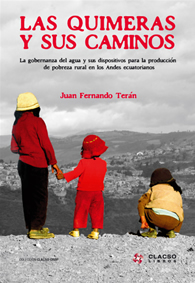Las quimeras y sus caminos: la gobernanza del agua y sus dispositivos para la producción de pobreza rural en los Andes ecuatorianos.

Juan Fernando TERAN. CLACSO-CROP Series. CLACSO. Buenos Aires, October 2007.
[The ways of the Chimeras: Water governance and its role in the production of rural poverty in the Ecuadorian Andes]
This book analyzes the relationship between water governance and the production of poverty in Cotopaxi, a province located in Ecuador and mostly inhabited by indigenous peoples. After discussing the contemporary institutional neoliberal view of the links between free trade and the welfare of the poor, the author draws on empirical data arguing that the Ecuadorian poverty does not stem from the population's cultural detachment or spatial disconnection from the markets.
Terán suggests that the real problem is that prevailing common sense makes one think that the reproduction of poverty is a non-intentional process. This is a convenient way of framing the issue for those who cont rol the power structures in society. Ultimately, by conceiving poverty as a spontaneous process which no particular group or individual can be blamed for, public policies can be presented as "neutral" interventions driven by either humanitarian or technical agents. The author argues however that the current status quo of poverty related problems must not be allowed to be accepted as the norm.







